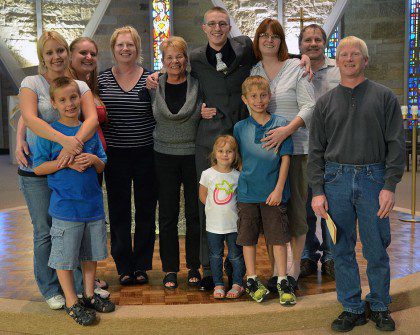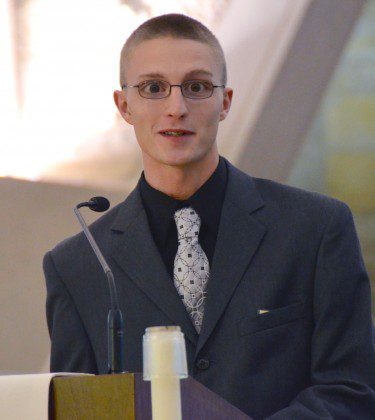
The following is Justin’s reflection on the two readings done during the Entrance to Novitiate prayer service. The readings follow his reflection.
“The most deadly poison of our time is indifference.” “The opposite of love is not hate, its indifference” These are two quotes that I always had a special fondness for. The first quote is from St. Maximillian Kolbe, and the second is from Eli Wiesel. Maximillian Kolbe and Eli Wiesel knew firsthand the atrocities that take place when we become indifferent to the injustices that are being done to others around us. Eli Wiesel is a very famous author and Nobel peace prize winner for his book Night where he tells about the horrors he faced while he was imprisoned in Auschwitz simply for being Jewish. St. Maximillian Kolbe like Eli Wiesel was also imprisoned in Auschwitz, however Maximillian Kolbe was sent to Auschwitz after it was discovered that he was hiding 2,000 Jews from the Nazis who occupied his native land of Poland, and unlike Eli Wiesel, Maximillian Kolbe did not survive.

Although we can’t say that things are not this bad here, still today genocide happens around the world. And even here thousands of men and women are homeless, countless children go without food, we say nothing while many in our country are not given the same equal treatment and rights that so many of us often take for granted, and we seem to ignore the fact that many sick and elderly are given second rate care. We often times tell ourselves things that make it easier for us to ignore what we don’t want to deal with like “they must have done something to put themselves in that situation” “if they would actually try to get a job”, or “It doesn’t affect me so why should I get involved”.
This is why I chose these two readings. Both these readings tell us that the love of Christ, which should be found in everyone who calls themselves Christian, is a love that is meant for everyone. No age, race, religion, nationality, or social status is excluded from that. We come to know and understand this love when we truly begin to read the message given to us in the gospels. This love then becomes implanted in our hearts when we begin to understand that not only did Christ sacrifice himself for each of us but that he did it out of love for each of us and opened his heart for each of us. We then begin to tear down the walls of indifference that language, race, religion, and whatever else separates us from one another, when we realize that the same love Christ has for us must be found in us, and we have to act on that love, sharing it with each and every person we come into contact with. Then and only then can the Kingdom of God be brought down from heaven to where it is truly needed here on earth.
The readings:
First Reading
A reading from the Spiritual Directory
This is the favorite precept of the Sacred Heart of Jesus.
“Charity is patient, is kind: charity does not envy, does not deal perversely, is not puffed up; is not ambitious, does not seek her own, is not provoked to anger, thinks no evil, bears all things, believes all things, hopes all things, endures all things”
Charity knows no difference of languages: “there is neither Jew nor Greek”. Among us differences of nationality should not be detrimental to unity.
If fraternal charity is always necessary in the religious life, is it not especially necessary among the friends and disciples of the Heart of Jesus?
Second Reading
A reading from the first Letter of John:
The way we came to know love was that he laid down his life for us;
so we ought to lay down our lives
for our sisters and brothers.
If someone who has worldly means sees a brother or sister in need
and refuses them compassion,
how can the love of God remain in that person?
Children, let us love not in word or speech
But in deed and truth.

